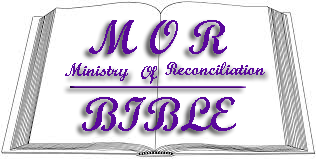|
Welcome to the MOR-Bible website March 2016 Printable .pdf (190 KB) The
February 2016 article discussed how man
was formed, made and created and how man initially was a three-part
being, consisting of body, soul and spirit. We discussed the commandment
God gave to Adam and Eve and learned how the serpent twisted and
deceived Eve. We know what died in Adam and Eve when they disobeyed
God's commandment and why God needed to reconcile us back to Him.
In losing the spirit of God, God needed to restore our spiritual
connection with Him through His son the Lord Jesus Christ. In Romans
10: 9-10, God provided instructions on how to restore our spiritual
connection with Him through His son the Lord Jesus Christ.
This
is how a person is born again; that's what it says: that's what
it means.
The
two Greek words in the New Testament, pneuma (spirit) hagion
(holy) are rarely used in reference to the Holy Spirit who is God,
the giver. Thus, pneuma hagion refers to the gift given on
the day of Pentecost, and should always be translated with a small
h and a small s. In other words, when the Bible refers to God's
gift of holy spirit, it must always be lower case h and s. John
3:6 will explain using both Spirit (God the giver) and spirit (the
gift from God).
God is Holy Spirit and can only give that which He is - holy spirit. The gift from God is "Christ in you the hope of glory" with all of it completeness as stated in Colossians 2:10.
Pneuma
hagion, as used in the New Testament beginning on the day of
Pentecost, refers to that which is received at the time of salvation
and to the inner function of the nine manifestations of the spirit
listed in 1 Corinthians 12: 7-11.
It
must be noted here that the phrase Holy Spirit has been translated
several different ways in the Bible. However, they all reference
God as giver when capitalized. In the Stephen's text, from which
King James Version is translated, the word pneuma is used
385 times. It is translated, with a capital S "Spirit"
133 times, small s "spirit" is used 153 times, "spiritually"
is used once, "spiritual" is used 1 time, "ghost"
is used 2 times, "life" is used one time, and "wind"
is used one time. The word hagion or holy, is translated
"Holy Spirit" 4 times and "Holy Ghost" 89 times.
The giver is God the Spirit and His gift is spirit! The key is to understand that God's gift is holy spirit which we received on Pentecost from God, as Holy Spirit. The holy spirit, pneuma hagion, is put into action by the will of man, which in turns produces the manifestations of the spirit. These manifestations are energized by the Holy Spirit, God. Let's look at the instructions Jesus gave to the Apostles. Just prior to Jesus' ascension, he instructed the apostles to "wait for the promise of the father" in Acts 1:4-5.
Additional instruction was given in Luke 24:49.
From these verses, we see that the "promise of the father" (pneuma hagion) in Acts 1:4-5 is the "power from on high" in Luke 24:49. The receiving of pneuma hagion is the same as or equal to "the promise of the Father." In other words, the receiving of God's gift is to be baptized with the holy spirit or pneuma hagion. We
can now be clear on precisely what originated on the day of Pentecost
and the resounding meaning of pneuma hagion as "power
from on high." The word power, dunamis, means spiritual
ability which we receive through holy spirit or God's gift, pneuma
hagion. The word dunamis is used today as our English
word "dynamite." Next
month's teaching will focus on what it means to "receive"
the gift of holy spirit. We will understand the Greek word origins
of the word "receive" as dechomai and lambano
and address concerns about the gift of holy spirit. Remember, it
is God's Will that we receive His gift of holy spirit when we are
born again. As an Ambassador for Christ, we were made righteousness
in Christ. In
the Lord,
|
|
© 2016-2021 MOR-BIBLE contactus@mor-bible.com

